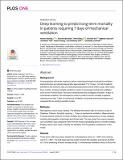Deep learning to predict long-term mortality in patients requiring 7 days of mechanical ventilation
Author(s)
George, Naomi; Moseley, Edward; Eber, Rene; Siu, Jennifer; Samuel, Mathew; Yam, Jonathan; Huang, Kexin; Celi, Leo Anthony G.; Lindvall, Charlotta; ... Show more Show less
Downloadjournal.pone.0253443.pdf (1.031Mb)
Publisher with Creative Commons License
Publisher with Creative Commons License
Creative Commons Attribution
Terms of use
Metadata
Show full item recordAbstract
Background: Among patients with acute respiratory failure requiring prolonged mechanical ventilation, tracheostomies are typically placed after approximately 7 to 10 days. Yet half of patients admitted to the intensive care unit receiving tracheostomy will die within a year, often within three months. Existing mortality prediction models for prolonged mechanical ventilation, such as the ProVent Score, have poor sensitivity and are not applied until after 14 days of mechanical ventilation. We developed a model to predict 3-month mortality in patients requiring more than 7 days of mechanical ventilation using deep learning techniques and compared this to existing mortality models.
Methods: Retrospective cohort study. Setting: The Medical Information Mart for Intensive Care III Database. Patients: All adults requiring ≥ 7 days of mechanical ventilation. Measurements: A neural network model for 3-month mortality was created using process-of-care variables, including demographic, physiologic and clinical data. The area under the receiver operator curve (AUROC) was compared to the ProVent model at predicting 3 and 12-month mortality. Shapley values were used to identify the variables with the greatest contributions to the model.
Results: There were 4,334 encounters divided into a development cohort (n = 3467) and a testing cohort (n = 867). The final deep learning model included 250 variables and had an AUROC of 0.74 for predicting 3-month mortality at day 7 of mechanical ventilation versus 0.59 for the ProVent model. Older age and elevated Simplified Acute Physiology Score II (SAPS II) Score on intensive care unit admission had the largest contribution to predicting mortality.
Discussion: We developed a deep learning prediction model for 3-month mortality among patients requiring ≥ 7 days of mechanical ventilation using a neural network approach utilizing readily available clinical variables. The model outperforms the ProVent model for predicting mortality among patients requiring ≥ 7 days of mechanical ventilation. This model requires external validation.
Date issued
2021-06Department
Massachusetts Institute of Technology. Institute for Medical Engineering & ScienceJournal
PLoS ONE
Publisher
Public Library of Science (PLoS)
Citation
George, Naomi et al. "Deep learning to predict long-term mortality in patients requiring 7 days of mechanical ventilation." PLoS ONE 16, 6 (June 2021): e0253443. © 2021 George et al.
Version: Final published version
ISSN
1932-6203